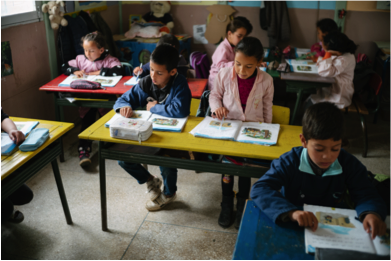Speeches Shim

Atika is a first grade teacher at Dar Kayd Ali primary school in a rural village at the foot of Morocco’s Atlas Mountains. Until recently, Atika struggled to make reading instruction interesting for her students. With memorization being the norm, her students recited texts, often by heart instead of with comprehension. She realized her students were unable to read new words aloud. Atika’s frustration grew daily as she saw the perplexed expression on her students’ faces when asked to identify letters or decode words.
In 2015, Atika embarked on what she described as the most significant turning point in her career. The USAID Reading for Success program (RFS) started working with 181 first grade teachers in public primary schools across Morocco. Atika was one of them.
"I hardly recognize myself either. This method of trusting the students' ability to figure it out on their own and develop their interest in reading was a great source of inspiration for me. I have become a facilitator. I only pass the ball and let the students play the game, wondering at the incredible goals they have been scoring!" Atika, first grade teacher
The program came in response to the need to improve basic literacy among early grade students and address one of the key weaknesses in the Moroccan educational system: poor reading skills.
In Morocco, many children speak colloquial Arabic Darija and come to school unfamiliar with standard Arabic, which is the official language of instruction. Teachers are faced with the challenging task of delivering reading lessons to their early grade students in a language entirely new to them. By launching evidence-based measures for teaching reading to early grade students in this context, the RFS program has begun to address these challenges.
Building upon the phonics-based approach, the RFS program was designed to train first and second grade teachers how to teach reading more effectively. The program exposes the students to the Arabic language and alphabet. Students learn that letters correspond to sounds and that words are made up of sounds, which can be put together in different ways to make different words.
Textbooks were developed and the illustrations and themes were adapted to students’ age and culture. Compelling and age-appropriate storytelling was introduced in the curriculum to help improve students’ ability to make the connection between letters and their sounds, build their vocabulary and improve their acquisition of reading skills. Teachers also received training and follow-up coaching to support implementing student-centered learning activities. After a mere three months of intervention, the results were impressive.
“My students embraced this learning approach immediately!” says Atika. “They have been transformed into eager learners. I would sometimes deliberately write an incorrect word and they would correct me right away. I hardly recognize them!”
Through the RFS program, USAID’s support of and collaboration with the Ministry of Education is contributing to improved learning outcomes across Morocco. Having trained more than 20,000 primary school educators and reached over 650,000 primary school students, the RFS program seeks to better prepare these students for future success.

Comment
Make a general inquiry or suggest an improvement.